牛津译林版英语六年级下册Unit 3-4复习资料
牛津译林版英语 六年级下册 Unit 3 A healthy diet 知识点与练习
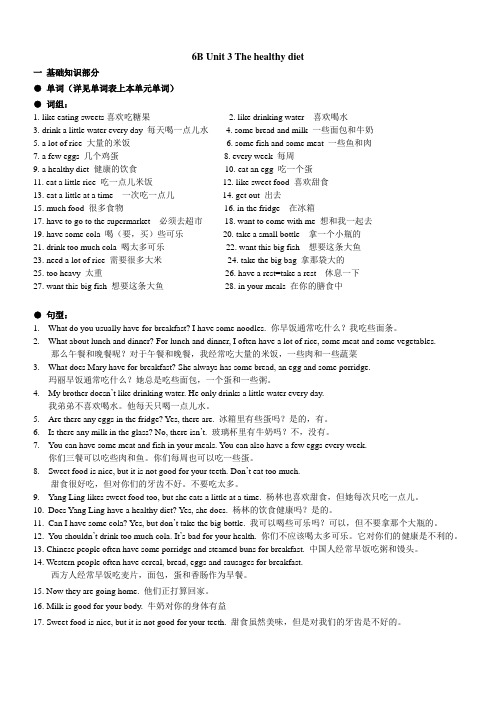
6B Unit 3 The healthy diet一基础知识部分●单词(详见单词表上本单元单词)●词组:1. like eating sweets喜欢吃糖果2. like drinking water 喜欢喝水3. drink a little water every day 每天喝一点儿水4. some bread and milk 一些面包和牛奶5. a lot of rice 大量的米饭6. some fish and some meat 一些鱼和肉7. a few eggs 几个鸡蛋8. every week 每周9. a healthy diet 健康的饮食10. eat an egg 吃一个蛋11. eat a little rice 吃一点儿米饭12. like sweet food 喜欢甜食13. eat a little at a time 一次吃一点儿14. get out 出去15. much food 很多食物16. in the fridge 在冰箱17. have to go to the supermarket 必须去超市18. want to come with me 想和我一起去19. have some cola 喝(要,买)些可乐20. take a small bottle 拿一个小瓶的21. drink too much cola 喝太多可乐22. want this big fish 想要这条大鱼23. need a lot of rice 需要很多大米24. take the big bag 拿那袋大的25. too heavy 太重26. have a rest=take a rest 休息一下27. want this big fish 想要这条大鱼28. in your meals 在你的膳食中●句型:1.What do you usually have for breakfast? I have some noodles. 你早饭通常吃什么?我吃些面条。
小学英语六年级下学期(牛津译林版)Unit 3-4复习资料
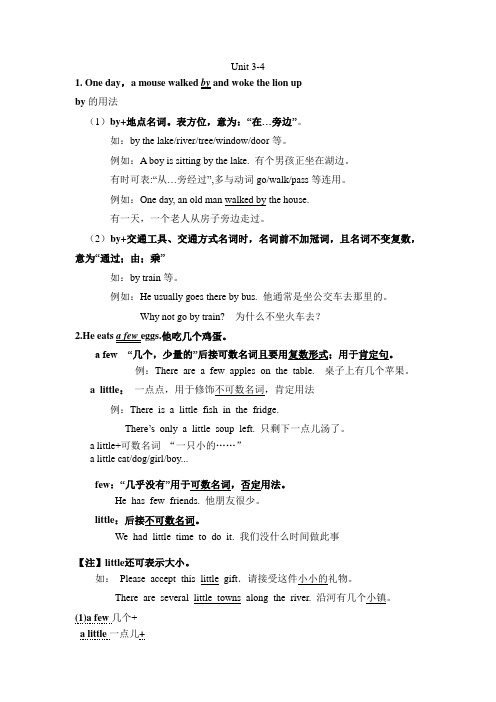
Unit 3-41. One day,a mouse walked by and woke the lion upby的用法(1)by+地点名词。
表方位,意为:“在…旁边”。
如:by the lake/river/tree/window/door等。
例如:A boy is sitting by the lake. 有个男孩正坐在湖边。
有时可表:“从…旁经过”,多与动词go/walk/pass等连用。
例如:One day, an old man walked by the house.有一天,一个老人从房子旁边走过。
(2)by+交通工具、交通方式名词时,名词前不加冠词,且名词不变复数,意为“通过;由;乘”如:by train等。
例如:He usually goes there by bus. 他通常是坐公交车去那里的。
Why not go by train? 为什么不坐火车去?2.He eats a few eggs.他吃几个鸡蛋。
a few “几个,少量的”后接可数名词且要用复数形式;用于肯定句。
例:There are a few apples on the table. 桌子上有几个苹果。
a little:一点点,用于修饰不可数名词,肯定用法例:There is a little fish in the fridge.There’s only a little soup left. 只剩下一点儿汤了。
a little+可数名词“一只小的……”a little cat/dog/girl/boy...few:“几乎没有”用于可数名词,否定用法。
He has few friends. 他朋友很少。
little:后接不可数名词。
We had little time to do it. 我们没什么时间做此事【注】little还可表示大小。
如:Please accept this little gift.请接受这件小小的礼物。
译林版(三起)六年级下册英语Unit3-4知识点归纳
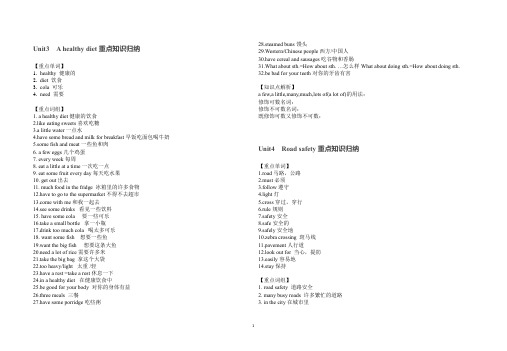
Unit3 A healthy diet重点知识归纳【重点单词】1.healthy 健康的2.diet 饮食3.cola 可乐4.need 需要【重点词组】1.a healthy diet健康的饮食2.like eating sweets喜欢吃糖3.a little water一点水4.have some bread and milk for breakfast早饭吃面包喝牛奶5.some fish and meat一些鱼和肉6.a few eggs几个鸡蛋7.every week每周8.eat a little at a time一次吃一点9. eat some fruit every day每天吃水果10. get out出去11.much food in the fridge冰箱里的许多食物12.have to go to the supermarket不得不去超市e with me和我一起去14.see some drinks看见一些饮料15.have some cola要一些可乐16.take a small bottle拿一小瓶17.drink too much cola喝太多可乐18.want some fish想要一些鱼19.want the big fish想要这条大鱼20.need a lot of rice需要许多米21.take the big bag拿这个大袋22.too heavy/light太重/轻23.have a rest=take a rest休息一下24.in a healthy diet在健康饮食中25.be good for your body对你的身体有益26.three meals 三餐27.have some porridge吃些粥28.steamed buns馒头29.Western/Chinese people西方/中国人30.have cereal and sausages吃谷物和香肠31.What about sth.=How about sth.…怎么样What about doing sth.=How about doing sth.32.be bad for your teeth对你的牙齿有害【知识点解析】a few,a little,many,much,lots of(a lot of)的用法:修饰可数名词:修饰不可数名词:既修饰可数又修饰不可数:Unit4Road safety重点知识归纳【重点单词】1.road马路,公路2.must必须3.follow遵守4.light灯5.cross穿过,穿行6.rule规则7.safety安全8.safe安全的9.safely安全地10.zebra crossing 斑马线11.pavement人行道12.look out for 当心,提防13.easily容易地14.stay保持【重点词组】1. road safety 道路安全2. many busy roads 许多繁忙的道路3. in the city在城市里4. cross the road safely 安全地过马路5. look at the traffic lights 看交通灯6. wait for the green man 等待绿灯7. keep safe 保持安全8. wait on the pavement 在人行道上等待9. look out for cars and bikes 小心小汽车和自行车10. look left/right 看左边/右边11. cross the road with other people 和其他人一起过马路12. see you easily 很容易看见你13.some children 一些孩子们14. a child 一个孩子15. play on the road 在路上玩16. follow the rules 遵守规则17. stay safe on the road 在路上保持安全18. must look for a zebra crossing 必须寻找一条斑马线19. wait at the bus station 在公交车站等20. wait for me 等我21. the other people 其他人22. mustn’t run quickly 绝不能快速地跑步,禁止跑得太快23. the left side of the road 马路的左边24. drive on the right side of the road 马路的右边驾驶25. except me 除了我26. go to see their aunt去看望他们的阿姨27. take the bus 乘车28. get on the bus 上车29. get off the bus 下车30. go on 继续,继续前进31. you’re sick 你生病了32. classroom rules 班级规则33. play ball games 玩球类游戏34. talk loudly 大声地谈论35. listen to your teachers carefully 仔细听老师上课【知识点解析】1.三个含有look的短语意思各不相同:look for寻找look at 看look out for小心,留神I am looking for my keys. 我在找我的钥匙。
六年级英语下册第三单元知识点整理(译林版)
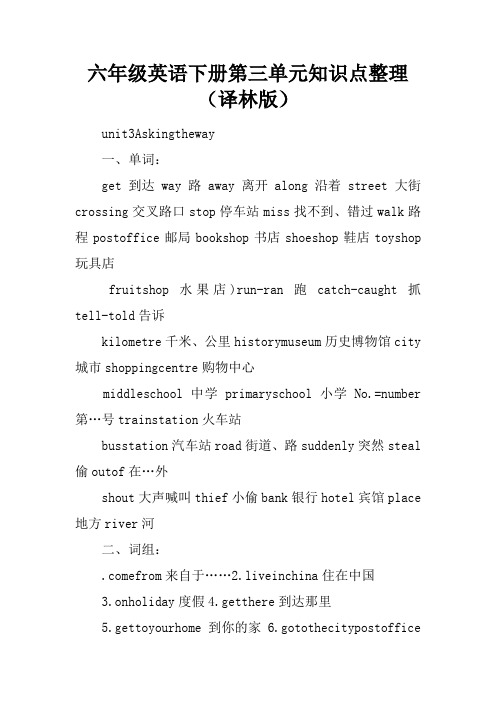
六年级英语下册第三单元知识点整理(译林版)unit3Askingtheway一、单词:get到达way路away离开along沿着street大街crossing交叉路口stop停车站miss找不到、错过walk路程postoffice邮局bookshop书店shoeshop鞋店toyshop 玩具店fruitshop水果店)run-ran跑catch-caught抓tell-told告诉kilometre千米、公里historymuseum历史博物馆city 城市shoppingcentre购物中心middleschool中学primaryschool小学No.=number 第…号trainstation火车站busstation汽车站road街道、路suddenly突然steal 偷outof在…外shout大声喊叫thief小偷bank银行hotel宾馆place 地方river河二、词组:.comefrom来自于……2.liveinchina住在中国3.onholiday度假4.getthere到达那里5.gettoyourhome到你的家6.gotothecitypostoffice去市邮局7.tellmethewayto告诉我去……的路8.letmesee让我想想9.goalongthisstreet沿着这条街走10.turnright/left向右/左转1.atthethirdcrossing在第三个十字路口12.onyourleft在你的左边3.youcan’tmissit.你不要错过。
14.howfar多远5.akilometreaway一公里远16.along/shortwalk一段很长/短的路7.takebusNo.5乘5路车18.howmanystops多少站9.atthebusstop公共汽车站20.everyfiveminutes每隔五分钟21.onRiverRoad在大江路22.inShanghaiStreet在上海街23.geton上车24.getoffatthethirdstop在第三个车站下车25.you’rewelcome.不客气/不必谢。
译林牛津英语6B 3-4单元总结归纳
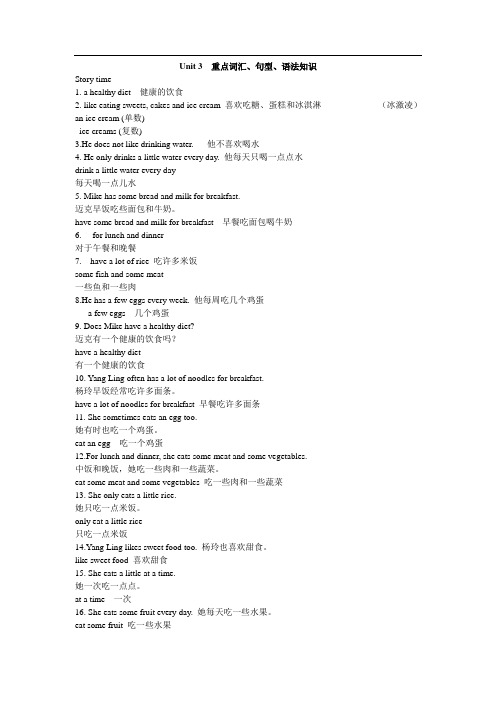
Unit 3 重点词汇、句型、语法知识Story time1. a healthy diet 健康的饮食2. like eating sweets, cakes and ice cream 喜欢吃糖、蛋糕和冰淇淋(冰激凌)an ice cream (单数)ice creams (复数)3.He does not like drinking water. 他不喜欢喝水4. He only drinks a little water every day. 他每天只喝一点点水drink a little water every day每天喝一点儿水5. Mike has some bread and milk for breakfast.迈克早饭吃些面包和牛奶。
have some bread and milk for breakfast 早餐吃面包喝牛奶6. for lunch and dinner对于午餐和晚餐7. have a lot of rice 吃许多米饭some fish and some meat一些鱼和一些肉8.He has a few eggs every week. 他每周吃几个鸡蛋a few eggs 几个鸡蛋9. Does Mike have a healthy diet?迈克有一个健康的饮食吗?have a healthy diet有一个健康的饮食10. Yang Ling often has a lot of noodles for breakfast.杨玲早饭经常吃许多面条。
have a lot of noodles for breakfast 早餐吃许多面条11. She sometimes eats an egg too.她有时也吃一个鸡蛋。
eat an egg 吃一个鸡蛋12.For lunch and dinner, she eats some meat and some vegetables.中饭和晚饭,她吃一些肉和一些蔬菜。
牛津译林版英语六年级下册第三单元重点知识
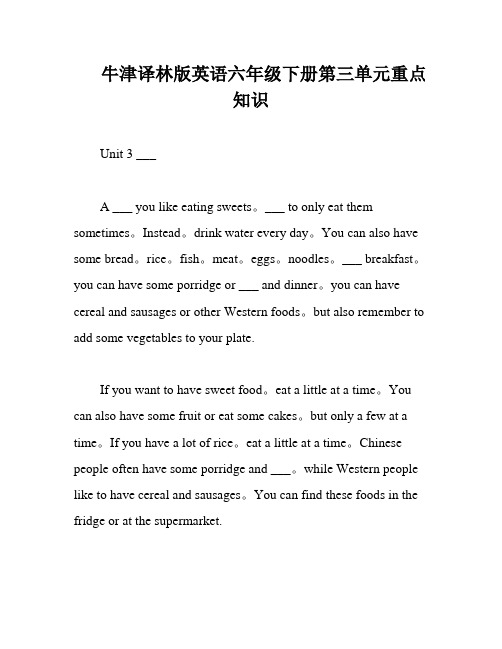
牛津译林版英语六年级下册第三单元重点知识Unit 3 ___A ___ you like eating sweets。
___ to only eat them sometimes。
Instead。
drink water every day。
You can also have some bread。
rice。
fish。
meat。
eggs。
noodles。
___ breakfast。
you can have some porridge or ___ and dinner。
you can have cereal and sausages or other Western foods。
but also remember to add some vegetables to your plate.If you want to have sweet food。
eat a little at a time。
You can also have some fruit or eat some cakes。
but only a few at a time。
If you have a lot of rice。
eat a little at a time。
Chinese people often have some porridge and ___。
while Western people like to have cereal and sausages。
You can find these foods in the fridge or at the supermarket.In the story。
a little mouse lives in her house。
She likes to eat a few things at a time。
like a little cheese or a few crumbs of ___ for her too。
新牛津译林版英语六年级下册Unit3复习纸
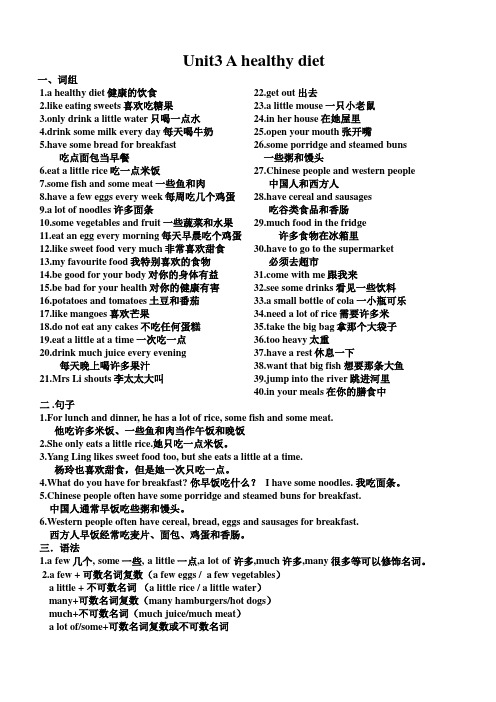
Unit3 A healthy diet 一、词组1.a healthy diet健康的饮食2.like eating sweets喜欢吃糖果3.only drink a little water只喝一点水4.drink some milk every day每天喝牛奶5.have some bread for breakfast吃点面包当早餐6.eat a little rice吃一点米饭7.some fish and some meat一些鱼和肉8.have a few eggs every week每周吃几个鸡蛋9.a lot of noodles许多面条10.some vegetables and fruit一些蔬菜和水果11.eat an egg every morning每天早晨吃个鸡蛋12.like sweet food very much非常喜欢甜食13.my favourite food我特别喜欢的食物14.be good for your body对你的身体有益15.be bad for your health对你的健康有害16.potatoes and tomatoes土豆和番茄17.like mangoes喜欢芒果18.do not eat any cakes不吃任何蛋糕19.eat a little at a time一次吃一点20.drink much juice every evening每天晚上喝许多果汁21.Mrs Li shouts李太太大叫22.get out出去23.a little mouse一只小老鼠24.in her house在她屋里25.open your mouth张开嘴26.some porridge and steamed buns 一些粥和馒头27.Chinese people and western people中国人和西方人28.have cereal and sausages吃谷类食品和香肠29.much food in the fridge许多食物在冰箱里30.have to go to the supermarket必须去超市e with me跟我来32.see some drinks看见一些饮料33.a small bottle of cola一小瓶可乐34.need a lot of rice需要许多米35.take the big bag拿那个大袋子36.too heavy太重37.have a rest休息一下38.want that big fish 想要那条大鱼39.jump into the river跳进河里40.in your meals在你的膳食中二 .句子1.For lunch and dinner, he has a lot of rice, some fish and some meat.他吃许多米饭、一些鱼和肉当作午饭和晚饭2.She only eats a little rice.她只吃一点米饭。
Unit 3-4期中复习词汇运用专项练习(,含答案)译林版六年级英语下册

Unit 3-4期中复习词汇运用专项练习用所给内容的适当形式填空1. Nancy________(go) to the park in Shanghai every year.2. I have________(many) milk.3. I want________(eat) a hamburger. Can you buy one for________(I)?4. There________(be) some cola in the fridge.5. My brother had a lot of________(apple) juice last night.6. I like________(sweet) food, but Helen________(do not).7. Mary________(have) some fish every day.8. It’s seven o’clock. You have________(go) to school now.9. Fruit and vegetables are________(health) food.10. He likes sweet________(food).11. There is some________(meat) and________(fish) in the fridge.12. I drink________(many) milk every day.13. There________(be not) any meat on my plate just now.14. He is asking Yang Ling how________(make) a kite.15. Please________(not pick) the flowers in the park.16. -Would you like________(some) apples?-Yes, please.17. I’d like________(watch) TV.18. Don’t make noise. My mother________(sleep) in the bedroom.19. -What about________(play) football?-Good idea!20. There is a lot of________(rain) in spring.21. -How many________(potato) are there?-Only one.22. -Are there any busy________(road) in the city?-No, there aren’t.23. Look! There’s a zebra________(cross) near us.24. Here are some________(rule) of our class.25. -________(can) we go and play table tennis?-No, you________(can).26. They must________(do) their homework________(one).27. We________(must) cross the road, because the light is red.28. I know a lot about road________(safe).29. I can do this________(easy).答案:1. goes 2. much 3. to eat, me 4. is 5. apple6. sweet, doesn’t7. has8. to go9. healthy 10. food11. meat, fish 12. much 13. wasn’t 14. to make 15. don’t pick16. some 17. to watch 18. is sleeping 19. playing 20. rain21. potatoes 22. roads 23. crossing 24. rules 25. Can, can’t26. do, first 27. mustn’t 28. safety 29. easily英汉互译1. My father________________________(吃一些鸡蛋作为早餐) yesterday morning.2. She drinks some milk__________________(一次).3. -Where were you?-I_________________(休息) in the living room.4. Do you want___________________(和我们一起去), Sam?5. -I’m thirsty. Can I_________________(喝一些可乐)?-Sure.6. I like swimming, and Nancy_________________(喜欢制作水果色拉).7. There was no juice at home. David________________(必须去超市).8. Look at the food in the fridge.______________9. In a healthy diet, there is a lot of fruit and vegetables.___________10. Chinese people often have some porridge and steamed buns for breakfast._____________________11. I____________________(看见红灯) just now.12. You should________________(当心汽车和自行车) on the street.13. There aren’t__________________(一些交通灯) here.14. Look! Some elephants__________________(正在和他们过马路).15. __________________(遵守交通规则) and stay safe on the road!16. People drive________________(在马路的右边) in Suzhou.17. The dog_______________(继续走), but soon it stops again.18. There are so many cars on the road. ______________19. You shouldn’t play on the street. _________________20. You should keep your desk clean and tidy. ________________答案:1. ate a few eggs for breakfast 2. at a time 3. had a rest4. to go with us5. drink some cola6. likes making fruit salads7. had to go to the supermarket 8. 冰箱里的食物9. 在一个健康的饮食中10. 吃一些粥和包子11. saw the red man 12. look out for cars and bikes 13. any traffic lights 14. are crossing the road with them15. Follow the traffic rules 16. on the right side of the road17. goes on 18. 如此多的汽车19. 不应该20. 保持你的课桌干净和整齐。
六年级下册英语-Unit4知识点整理-译林版
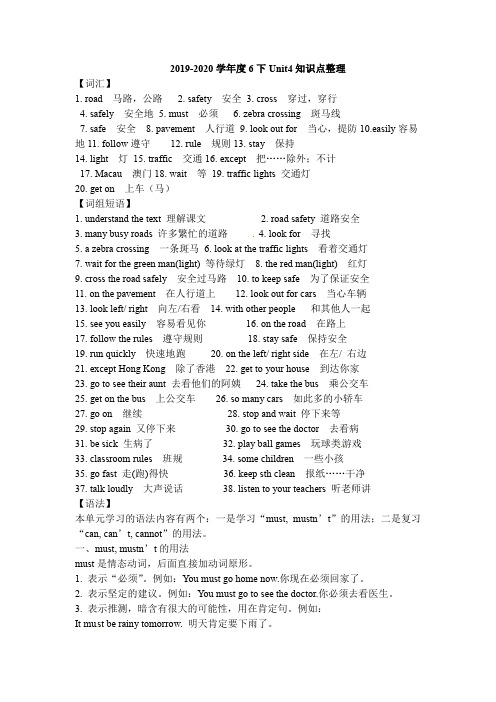
2019-2020学年度6下Unit4知识点整理【词汇】1. road 马路,公路2. safety 安全3. cross 穿过,穿行4. safely 安全地5. must 必须6. zebra crossing 斑马线7. safe 安全8. pavement 人行道9. look out for 当心,提防10.easily容易地11. follow遵守12. rule 规则13. stay 保持14. light 灯15. traffic 交通16. except 把……除外;不计17. Macau 澳门18. wait 等19. traffic lights 交通灯20. get on 上车(马)【词组短语】1. understand the text 理解课文2. road safety 道路安全3. many busy roads 许多繁忙的道路4. look for 寻找5. a zebra crossing 一条斑马6. look at the traffic lights 看着交通灯7. wait for the green man(light) 等待绿灯8. the red man(light) 红灯9. cross the road safely 安全过马路10. to keep safe 为了保证安全11. on the pavement 在人行道上12. look out for cars 当心车辆13. look left/ right 向左/右看14. with other people 和其他人一起15. see you easily 容易看见你16. on the road 在路上17. follow the rules 遵守规则18. stay safe 保持安全19. run quickly 快速地跑20. on the left/ right side 在左/ 右边21. except Hong Kong 除了香港22. get to your house 到达你家23. go to see their aunt 去看他们的阿姨24. take the bus 乘公交车25. get on the bus 上公交车26. so many cars 如此多的小轿车27. go on 继续28. stop and wait 停下来等29. stop again 又停下来30. go to see the doctor 去看病31. be sick 生病了32. play ball games 玩球类游戏33. classroom rules 班规34. some children 一些小孩35. go fast 走(跑)得快36. keep sth clean 报纸……干净37. talk loudly 大声说话38. listen to your teachers 听老师讲【语法】本单元学习的语法内容有两个:一是学习“must, mustn’t”的用法;二是复习“can, can’t, cannot”的用法。
小学英语六年级下册(牛津译林版) Unit 3 A healthy diet 知识点与练习

6B Unit 3 The healthy diet一基础知识部分●单词(详见单词表上本单元单词)●词组:1. like eating sweets喜欢吃糖果2. like drinking water 喜欢喝水3. drink a little water every day 每天喝一点儿水4. some bread and milk 一些面包和牛奶5. a lot of rice 大量的米饭6. some fish and some meat 一些鱼和肉7. a few eggs 几个鸡蛋8. every week 每周9. a healthy diet 健康的饮食10. eat an egg 吃一个蛋11. eat a little rice 吃一点儿米饭12. like sweet food 喜欢甜食13. eat a little at a time 一次吃一点儿14. get out 出去15. much food 很多食物16. in the fridge 在冰箱17. have to go to the supermarket 必须去超市18. want to come with me 想和我一起去19. have some cola 喝(要,买)些可乐20. take a small bottle 拿一个小瓶的21. drink too much cola 喝太多可乐22. want this big fish 想要这条大鱼23. need a lot of rice 需要很多大米24. take the big bag 拿那袋大的25. too heavy 太重26. have a rest=take a rest 休息一下27. want this big fish 想要这条大鱼28. in your meals 在你的膳食中●句型:1.What do you usually have for breakfast? I have some noodles. 你早饭通常吃什么?我吃些面条。
译林牛津六年级下6b Unit3-4

vegetable & fruit
grains
谷物
beans & protein food
豆类和蛋白质
sweet food
甜食
protein
蛋白质
Look and write
a lot of a little
a lot of
some a few
some
Write and talk
Write down your healthy diet and discuss with your friends.
2. Do some exercise. 3. Review the whole unit
(words/phrases/sentences/text).
Tips: a little +不可数名词 a few +可数名词
a lot of/some/any+可数/不可数名词
Can you introduce their diet?
Talk in pairs. In their diet, there is /some/a lot of/ a little... There are some/ a lot of/ a few... I think their diet is...because...
Food pyramid
I want to be more healthy. So I make a healthy diet for myself. I...for breakfast. For lunch and dinner, I... I...every day.
...
1. Finish your healthy diet and discuss it with your friend or family.
牛津译林版英语六年级下册第三单元重点知识
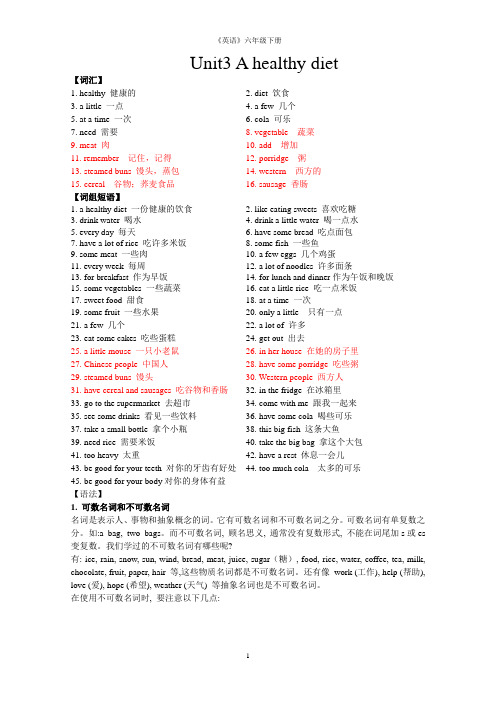
Unit3 A healthy diet【词汇】1. healthy 健康的2. diet 饮食3. a little 一点4. a few 几个5. at a time 一次6. cola 可乐7. need 需要8. vegetable 蔬菜9. meat 肉10. add 增加11. remember 记住,记得12. porridge 粥13. steamed buns 馒头,蒸包14. western 西方的15. cereal 谷物;荞麦食品16. sausage 香肠【词组短语】1. a healthy diet 一份健康的饮食2. like eating sweets 喜欢吃糖3. drink water 喝水4. drink a little water 喝一点水5. every day 每天6. have some bread 吃点面包7. have a lot of rice 吃许多米饭8. some fish 一些鱼9. some meat 一些肉10. a few eggs 几个鸡蛋11. every week 每周12. a lot of noodles 许多面条13. for breakfast 作为早饭14. for lunch and dinner作为午饭和晚饭15. some vegetables 一些蔬菜16. eat a little rice 吃一点米饭17. sweet food 甜食18. at a time 一次19. some fruit 一些水果20. only a little 只有一点21. a few 几个22. a lot of 许多23. eat some cakes 吃些蛋糕24. get out 出去25. a little mouse 一只小老鼠26. in her house 在她的房子里27. Chinese people 中国人28. have some porridge 吃些粥29. steamed buns 馒头30. Western people 西方人31. have cereal and sausages 吃谷物和香肠32. in the fridge 在冰箱里33. go to the supermarket 去超市34. come with me 跟我一起来35. see some drinks 看见一些饮料36. have some cola 喝些可乐37. take a small bottle 拿个小瓶38. this big fish 这条大鱼39. need rice 需要米饭40. take the big bag 拿这个大包41. too heavy 太重42. have a rest 休息一会儿43. be good for your teeth 对你的牙齿有好处44. too much cola 太多的可乐45. be good for your body对你的身体有益【语法】1. 可数名词和不可数名词名词是表示人、事物和抽象概念的词。
牛津译林版六年级下册英语单元+Unit 3 A healthy diet重难点精讲精练 (含答案)

Unit 3 A healthy diet重难点讲解(含答案)一、重点词汇讲解1.healthy 健康的adj.名词形式:health ★★例:对健康不好be bad for health音标:ea /i:/ weak, reach, please, eat, teach, teacher, easy, tea, meat, mean, peach /e/healthy, bread, breakfast, heavy, sweater, weather, head/iə/idea/ei/great, break例:感觉身体健康feel healthy看起来身体很好look healthy健康的食物healthy food他是一个健康的男孩。
He is a healthy boy.反义词:sick生病的★★例:帮助病人help sick people2. diet 饮食n.用法:一般用作不可数名词,但当有形容词修饰diet时,在前面加a例:健康的饮食a healthy diet在一个健康的饮食中in a healthy diet迈克有健康的饮食吗?Does Mike have a healthy diet?3. a little一点用法:a little +不可数名词例:他每天只喝一点水。
He only drinks a little water every day.我会说一点英语。
I can speak a little English.杯子里有一点儿水。
There is a little water in the glass.她只吃一点米饭。
She only eats a little rice.4. a few 几个用法:a few+可数名词复数例:他每周吃几个鸡蛋。
He eats a few eggs every week.他有几个朋友。
He has a few friends.几天a few days5. at a time一次例:杨玲也喜欢甜食,但她一次吃一点。
六年级下册英语知识素材 Unit 3-Unit 4单元复习及拓展练习 译林版(三起)(无答案)
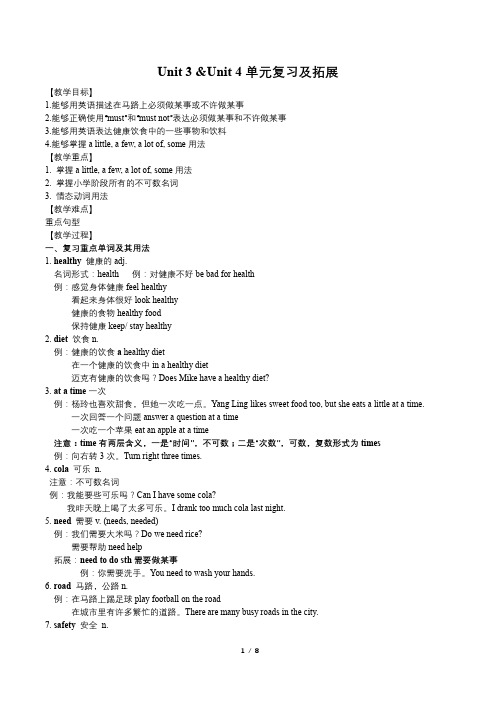
Unit 3 &Unit 4单元复习及拓展【教学目标】1.能够用英语描述在马路上必须做某事或不许做某事2.能够正确使用“must”和“must not”表达必须做某事和不许做某事3.能够用英语表达健康饮食中的一些事物和饮料4.能够掌握a little, a few, a lot of, some用法【教学重点】1. 掌握a little, a few, a lot of, some用法2. 掌握小学阶段所有的不可数名词3. 情态动词用法【教学难点】重点句型【教学过程】一、复习重点单词及其用法1. healthy健康的adj.名词形式:health 例:对健康不好be bad for health例:感觉身体健康feel healthy看起来身体很好look healthy健康的食物healthy food保持健康keep/ stay healthy2. diet饮食n.例:健康的饮食a healthy diet在一个健康的饮食中in a healthy diet迈克有健康的饮食吗?Does Mike have a healthy diet?3. at a time一次例:杨玲也喜欢甜食,但她一次吃一点。
Yang Ling likes sweet food too, but she eats a little at a time.一次回答一个问题answer a question at a time一次吃一个苹果eat an apple at a time注意:time有两层含义,一是“时间”,不可数;二是“次数”,可数,复数形式为times例:向右转3次。
Turn right three times.4. cola可乐n.注意:不可数名词例:我能要些可乐吗?Can I have some cola?我昨天晚上喝了太多可乐。
I drank too much cola last night.5. need需要v. (needs, needed)例:我们需要大米吗?Do we need rice?需要帮助need help拓展:need to do sth需要做某事例:你需要洗手。
六下英语各单元知识点汇总译林版

六下英语各单元知识点汇总译林版Unit1 Where's your pen pal from?1. 动词be的用法:用于描述人或物的特征、身份、国籍等。
2.询问国籍的用语:住在哪里?来自哪里?3. 询问家庭成员:Who's that man/the boy/the girl/the woman in the photo?4. 介绍自己的国家:I'm from China. It's in Asia.5. 询问并描述地理位置:Where is it? It's in the south of China.6. 表示方位的词:north, south, east, west7. 询问个人信息:What's your name, age, address, telephone number?8. 注意:第三人称单数的be动词用is。
Unit2 My day1.询问人们的日常活动:- What do you often do on weekends?- Do you often watch TV in the evening?- Do you often read after dinner?2.描述一天中的活动顺序:I get up at 7 o'clock. Then I have breakfast. After that, I go to school.3. 介词on的用法:on Monday, on Tuesday等等。
4. 表示时间的表达:in the morning/afternoon/evening/night, at 7 o'clock等。
5. 小学生常见的一些科目名称:Chinese, English, Math, Science 等。
6. 物品名称:book, pen, pencil, ruler等。
7. 询问喜欢的活动:What do you like doing after school?8. 询问他人的常见活动:Does he/she often...?Unit3 At the zoo1. 描述动物:long neck, big eyes, sharp teeth等。
小学英语六年级下册(牛津译林版)Unit3Ahealthydiet知识点归纳与练习题
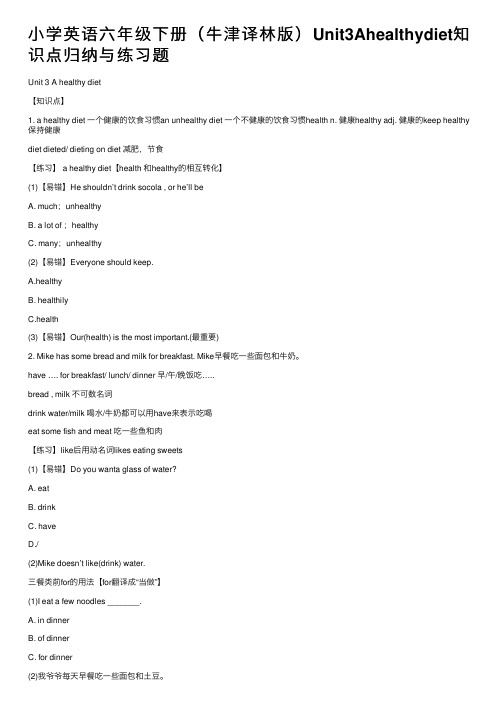
⼩学英语六年级下册(⽜津译林版)Unit3Ahealthydiet知识点归纳与练习题Unit 3 A healthy diet【知识点】1. a healthy diet ⼀个健康的饮⾷习惯an unhealthy diet ⼀个不健康的饮⾷习惯health n. 健康healthy adj. 健康的keep healthy 保持健康diet dieted/ dieting on diet 减肥,节⾷【练习】 a healthy diet【health 和healthy的相互转化】(1)【易错】He shouldn’t drink socola , or he’ll beA. much;unhealthyB. a lot of ;healthyC. many;unhealthy(2)【易错】Everyone should keep.A.healthyB. healthilyC.health(3)【易错】Our(health) is the most important.(最重要)2. Mike has some bread and milk for breakfast. Mike早餐吃⼀些⾯包和⽜奶。
have …. for breakfast/ lunch/ dinner 早/午/晚饭吃…..bread , milk 不可数名词drink water/milk 喝⽔/⽜奶都可以⽤have来表⽰吃喝eat some fish and meat 吃⼀些鱼和⾁【练习】like后⽤动名词likes eating sweets(1)【易错】Do you wanta glass of water?A. eatB. drinkC. haveD./(2)Mike doesn’t like(drink) water.三餐类前for的⽤法【for翻译成“当做”】(1)I eat a few noodles _______.A. in dinnerB. of dinnerC. for dinnerMy grandpasome bread andbreakfastday.重要句型:What do you have for breakfast?你早餐吃什么?What do you often havebreakfast? A. in B. for C. about D. of3. Yang Ling likes sweet food too, but she eats a little at a time. 杨玲也喜欢吃甜⾷,但是她⼀次只吃⼀点点。
六下英语各单元知识点译林版
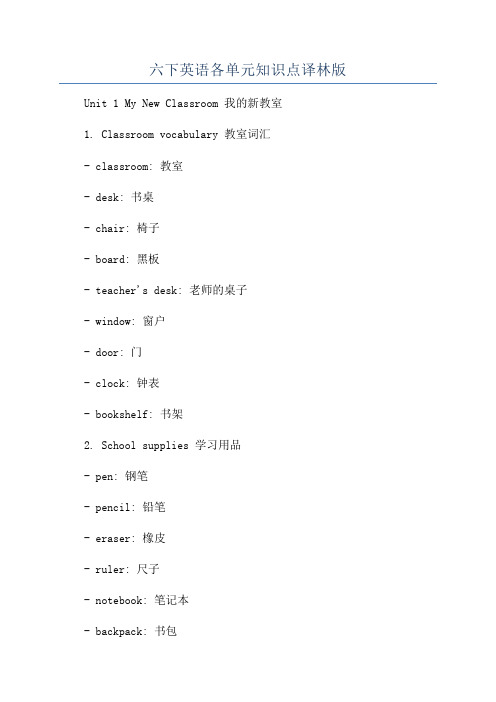
六下英语各单元知识点译林版Unit 1 My New Classroom 我的新教室1. Classroom vocabulary 教室词汇- classroom: 教室- desk: 书桌- chair: 椅子- board: 黑板- teacher's desk: 老师的桌子- window: 窗户- door: 门- clock: 钟表- bookshelf: 书架2. School supplies 学习用品- pen: 钢笔- pencil: 铅笔- eraser: 橡皮- ruler: 尺子- notebook: 笔记本- backpack: 书包- glue: 胶水- scissors: 剪刀- crayon: 蜡笔- marker: 马克笔3. Sentences 句子- This is my new classroom. 这是我的新教室。
- There is a blackboard on the wall. 墙上有一个黑板。
- I sit at the desk. 我坐在桌子旁边。
- The teacher stands in front of the classroom. 老师站在教室前面。
Unit 2 I'm a Student 我是学生1. School subjects 学科- Chinese: 语文- English: 英语- math: 数学- science: 科学- history: 历史- geography: 地理- art: 美术- music: 音乐- physical education: 体育2. Daily schedules 日程安排- I have Chinese class in the morning. 早上我有语文课。
- We have math class in the afternoon. 下午我们有数学课。
- We have art class on Wednesday. 我们星期三有美术课。
译林版六年级下册英语Unit3-4试题
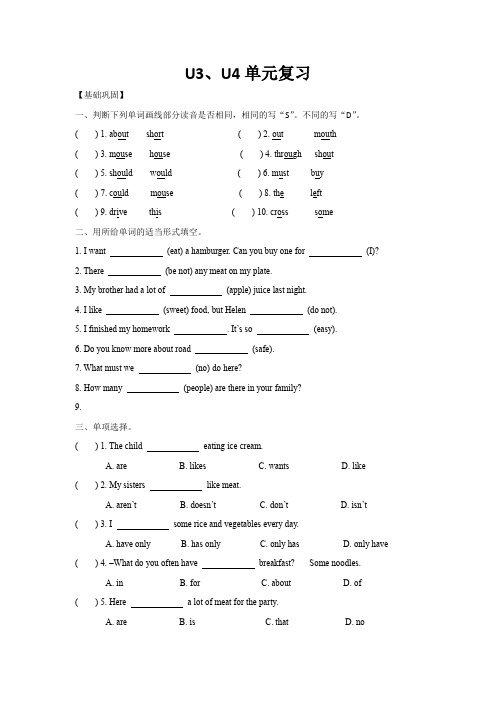
U3、U4单元复习【基础巩固】一、判断下列单词画线部分读音是否相同,相同的写“S”。
不同的写“D”。
( ) 1. about short ( ) 2. out mouth( ) 3. mouse house ( ) 4. through shout( ) 5. should would ( ) 6. must buy( ) 7. could mouse ( ) 8. the left( ) 9. drive this ( ) 10. cross some二、用所给单词的适当形式填空。
1. I want (eat) a hamburger. Can you buy one for (I)?2. There (be not) any meat on my plate.3. My brother had a lot of (apple) juice last night.4. I like (sweet) food, but Helen (do not).5. I finished my homework . It’s so (easy).6. Do you know more about road (safe).7. What must we (no) do here?8. How many (people) are there in your family?9.三、单项选择。
( ) 1. The child eating ice cream.A. areB. likesC. wantsD. like ( ) 2. My sisters like meat.A. aren’tB. doesn’tC. don’tD. isn’t ( ) 3. I some rice and vegetables every day.A. have onlyB. has onlyC. only hasD. only have ( ) 4. –What do you often have breakfast? --Some noodles.A. inB. forC. aboutD. of ( ) 5. Here a lot of meat for the party.A. areB. isC. thatD. no( ) 6. I can drive the car .A. safetyB. safelyC. safeD. safes( ) 7. My car is over there. It’s red.A. oneB. firstC. twoD. three( ) 8. –Will you go to the supermarket?--Yes, please me.A. waitB. wait ofC. wait forD. waits( ) 9. The boy the right is my brother.A. inB. onC. atD. by( ) 10. We mustn’t shout run in class.A. andB. orC. withD. of( ) 11. a healthy diet, there is rice and bread.A. OnB. InC. AtD. Of( ) 12. There any fruit or vegetables on the table.A. isB. isn’tC. areD. aren’t ( ) 13. Milk is good you. Please drink more milk.A. atB. ofC. forD. in( ) 14. They in the kitchen.A. also areB. are alsoC. also aren’tD. also( ) 15. I don’t like meat fish.A. andB. orC. ofD. but( ) 16. –How can you go to the zoo? --I can a bus.A. byB. getC. takeD. takes ( ) 17. –Are you thirteen or fourteen?--.A. Yes.B. No.C. No, I’m thirteen.D. I’m thirteen. ( ) 18. Each student some storybooks.A. haveB. hasC. havingD. haves四、根据实际情况回答问题。
- 1、下载文档前请自行甄别文档内容的完整性,平台不提供额外的编辑、内容补充、找答案等附加服务。
- 2、"仅部分预览"的文档,不可在线预览部分如存在完整性等问题,可反馈申请退款(可完整预览的文档不适用该条件!)。
- 3、如文档侵犯您的权益,请联系客服反馈,我们会尽快为您处理(人工客服工作时间:9:00-18:30)。
Unit 3-41. One day,a mouse walked by and woke the lion upby的用法(1)by+地点名词。
表方位,意为:“在…旁边”。
如:by the lake/river/tree/window/door等。
例如:A boy is sitting by the lake. 有个男孩正坐在湖边。
有时可表:“从…旁经过”,多与动词go/walk/pass等连用。
例如:One day, an old man walked by the house.有一天,一个老人从房子旁边走过。
(2)by+交通工具、交通方式名词时,名词前不加冠词,且名词不变复数,意为“通过;由;乘”如:by train等。
例如:He usually goes there by bus. 他通常是坐公交车去那里的。
Why not go by train? 为什么不坐火车去?2.He eats a few eggs.他吃几个鸡蛋。
a few “几个,少量的”后接可数名词且要用复数形式;用于肯定句。
例:There are a few apples on the table. 桌子上有几个苹果。
a little:一点点,用于修饰不可数名词,肯定用法例:There is a little fish in the fridge.There’s only a little soup left. 只剩下一点儿汤了。
a little+可数名词“一只小的……”a little cat/dog/girl/boy...few:“几乎没有”用于可数名词,否定用法。
He has few friends. 他朋友很少。
little:后接不可数名词。
We had little time to do it. 我们没什么时间做此事【注】little还可表示大小。
如:Please accept this little gift.请接受这件小小的礼物。
There are several little towns along the river. 沿河有几个小镇。
(1)a few几个+__________a little一点儿+__________A lot of 许多,既可加__________,又可加__________。
Some/any一些既可加__________,又可加__________。
(2) much修饰__________,意思是“__________”通常用于__________句中many与__________形式连用。
例如:too__________cola(3) Mum, do we need any rice? need意思是“__________”(4) YangLing likes sweet food too, but she eats a little at a a time. at a time 是“__________”的意思。
3.He usually finishes his homework before dinner.one’s的用法:词组有:brush one’s teeth 刷牙do one’s homework 做回家作业one’s代表“某人的”,在句子中要用物主代词来替换它,一般情况下是与主语相呼应。
如:We should brush our teeth every morning. 我们应该每天早上刷牙。
She often does her homework before dinner. 她经常晚饭前做作业。
4. turn(1)n.轮流、依次轮流的顺序E.g .Now it’s your turn to read the text. 现在轮到你读课文了。
It's my turn to use the bike. 该轮到我用自行车了。
(2) v.转变,变成【短语】turn into变成E.g .Water turns into ice. 水变成了冰。
turn ... into ... (使……)成为……E.g. The farmers are turning waste land into rice fields. 农民们把荒地变成了稻田。
5. point v. 指【短语】point at指着;point to指向;point out指出E.g. A l ittle boy pointed at the king and laughed…一个小男孩指着国王并大笑着……The boy pointed at the book and said,“it’s mine.”那个男孩指着那本书说:“它是我的书。
”【辨析】point at & point topoint at习惯上表示指向离说话人较近的事物,意为“指着”,at是介词,着重于指的对象,指人时一般表示粗鲁或不礼貌。
例如:The teacher pointed at the blackboa rd and said,“you must look carefully.”point to多用来表示指向离说话人较远的事物,意为“指向”,to 是介词,强调方向,并不是指着该物体。
例如:He pointed to the house on the other side of the river and said,“that’s my home.”他指向河对岸的房子说:“那是我的家。
”6.we need a lot of rice 我们需要许多米。
一、need:用作情态动词后接动词原形,是“需要,必要”的意思。
没有人称和数的变化。
不论主语是第几人称,不论主语是单数还是复数,情态都词都无形式变化,1.肯定句:主语+need + do +其他。
2.否定式:主语+needn’t+ do +其他。
You needn’t clean the house now. 你不必现在打扫房子。
3.疑问句Need +主语+ do+其他…?need引导的疑问句,肯定回答要用must。
—Need I call him up now? 我需要现在给他打电话吗? ——Yes, you must. 是的,需要打。
—No, you needn’t. 不,不需要现在打。
二、用作实义动词作为实义动词,need后面的宾语可以是名词、动名词、动词不定式或代词,这种情况下,need既可用于肯定句,也可用于否定句和疑问句,构成否定句和疑问句时要借助于助动词do或does。
(一)need to do sth.作为实义动词,need后面需要接带to的动词不定式,表示有义务或责任去做某事。
1.肯定句:主语+need + to do +其他。
You need to take good care of your mother. 你要好好照料你妈妈2.否定句:主语+don’t/ doesn’t/didn’t need + to do sth例:You don’t need to take good care of your mother.你不需要好好照料你妈妈。
3.疑问句:Do/does +主语+ need to do sth?例:Does she need to do the cooking? 她需要做饭吗?Yes, she does.是的,她需要做饭。
No, she doesn’t.不,她不必做饭。
4.特殊疑问句; 特殊疑问词+助动词+主语+need+其他?例:What do we need to take for the picnic? 野餐我们需要带些什么?(二)need + 名词这是need最常见的用法之一,其后的宾语可以是名词,也可以是代词。
如:1). We need a great deal of money now. 我们需要和多钱。
2). They don’t need it any more. 他们不再需要它了。
3). Does your father need any help? 你爸爸需要帮助吗?They need my love and care. 他们需要我的关爱。
(三)need doing表示被动含义=need to be done。
The clothes need washing.这些衣服需要洗了。
= The clothes need to be washed.三、用作名词need作为名词,含义为“缺乏,需要”;其复数表示“基本需要”We are in need of your help.我们需要你的帮助。
A friend in need is a friend indeed. 患难见真情。
There is no need to persuade him to follow my advice.没必要说服他采纳我的意见。
There’s no need for you to start yet. 你现在还不必动身。
There isn’t much need for further research. 没有必要进一步的实验。
satisfy /meet their needs满足他们的需要7.How can you cross the road safely?你可以如何安全的过马路?cross,across和through都有“穿过”的意思,但用法不同。
cross 动词表示动作是从物体的表面上进行的,强调从一端到另一端,如过河,过桥,过马路等。
across 介词表示动作是从物体的表面上进行的,强调从一端到另一端。
cross =v.+across,如:Go across the bridge.=Cross the bridge.through介词它的含义与in有关,表示动作是在某一物体的内部空间进行的。
如穿过一道门,穿过森林、乡镇、城市等。
例句:They walked through the gate with Uncle Wang.【拓展】crossroads是“十字路”或“十字路口”的意思,它的前面可以用a,但-s是不能丢掉的。
例:The accident took place at a crossroads. 车祸发生在十字路口。
crossroad是基督教的用语,指“十字架的道路”,不是十字路口。
《十字架的道路》表示基督徒在信奉基督时要愿意为宗教牺牲,对信徒而言,这是一条很难走的道路。
crossing是“渡口”、“横道线”或“(铁路与公路的)交叉点”。
All car should stop at the zebra crossing. 所有车辆都要在斑马线前停下。
